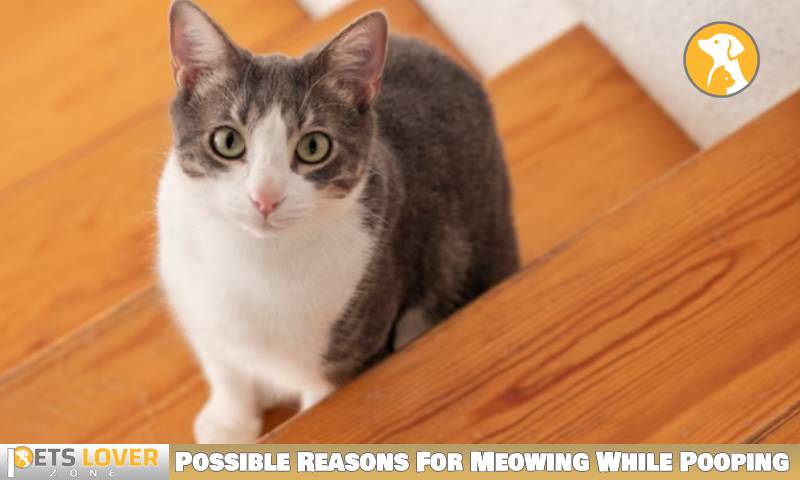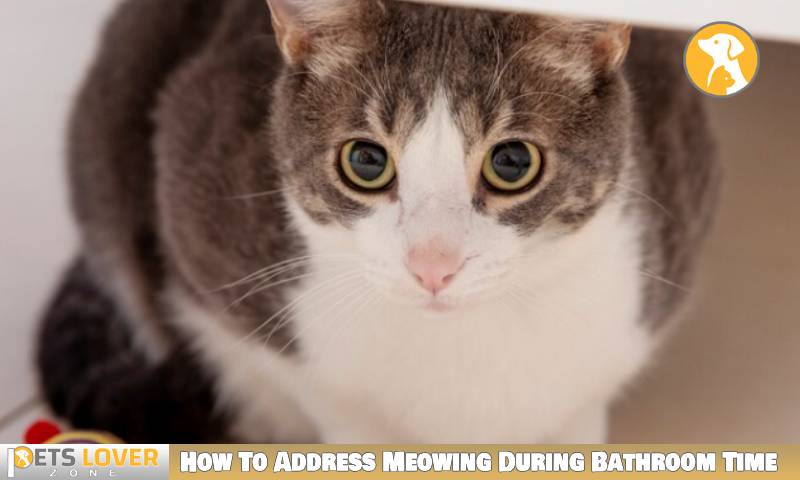Kittens meow when they poop because it may be uncomfortable or painful for them. When cats eliminate waste, it can cause pressure on their rectum, leading to vocalization.
This behavior is common in kittens, as they are still developing their bowel movements. Some kittens may meow more frequently than others due to underlying health issues such as constipation or diarrhea. If you notice excessive meowing or other signs of discomfort during bowel movements, it is best to consult a veterinarian for a proper diagnosis and treatment.
Providing a balanced diet, plenty of water, and regular exercise can help promote healthy digestion in kittens.
Understanding Kitten Behavior During Bathroom Time
Kittens are adorable little creatures that bring so much joy into our lives. However, if you are a new kitten parent, you may have noticed that your furry friend often meows while pooping. This behavior can be puzzling and may leave you wondering why your kitten feels the need to vocalize during bathroom time.
In this section, we will explore the natural instincts behind a kitten’s vocalizations and how meowing can serve as a communication tool.
The Natural Instincts Behind A Kitten’S Vocalizations
- Kittens meow when pooping due to their innate instinct for communication. This behavior is rooted in their need to express themselves and communicate their needs to their human companions.
- Just like human infants, kittens rely on vocalizations as a way of getting attention and conveying their emotions. Meowing while pooping is their way of reaching out and seeking reassurance from their trusted parent.
- It’s important to remember that kittens are vulnerable creatures, and their vocalizations during bathroom time may also be a response to feeling exposed or anxious. Meowing can be their way of seeking comfort and security during this potentially vulnerable moment.
- As kittens grow older and become more comfortable in their surroundings, they may gradually reduce or even eliminate the meowing behavior during bathroom time. This is a sign of their increased confidence and familiarity with their environment.
How Meowing Can Serve As A Communication Tool
- Meowing is one of the primary ways kittens communicate with their human owners. By meowing while pooping, your kitten may be trying to grab your attention and let you know that they are in need of assistance or reassurance.
- It’s crucial to pay attention to the tone and frequency of your kitten’s meows. Different meow patterns can convey different messages. For example, a louder and more urgent meow may indicate discomfort or pain, while a softer meow may simply be a form of seeking companionship.
- If you notice that your kitten consistently meows excessively or displays distressing behavior while pooping, it’s essential to monitor their overall health and consult with a veterinarian if necessary. Excessive meowing during bathroom time can sometimes be a sign of underlying health issues that require medical attention.
- While meowing during bathroom time is generally harmless and normal for kittens, it’s essential to create a safe and comfortable environment for your furry friend. Providing a clean litter box, maintaining a consistent routine, and offering plenty of love and reassurance can help alleviate any potential stress or anxiety during this time.
Understanding your kitten’s behavior during bathroom time can help foster a stronger bond between you and your furry friend. By recognizing their innate need for communication and providing them with a secure and nurturing environment, you can ensure that your kitten feels safe and loved, even during their private moments in the litter box.
Possible Reasons For Meowing While Pooping

Has your adorable little kitten been meowing while pooping? It might seem strange, but there can actually be a few different reasons why your furry friend is making those curious sounds in the litter box. In this section, we’ll explore some possible explanations for this peculiar behavior.
Uncomfortable Litter Box Conditions
- The litter box might not be clean enough: Cats are naturally clean animals, and if their litter box is dirty or has an unpleasant odor, it can make them uncomfortable while doing their business.
- Improper litter box placement: If the litter box is located in a noisy or high-traffic area, your kitten may feel stressed or anxious while trying to poop, leading to meowing.
- Inadequate litter: Some cats have preferences for certain types of litter. It’s possible that the litter you’re using is causing discomfort or irritation, leading to meowing.
Irritation Or Pain In The Digestive System
- Digestive issues: Just like humans, cats can experience digestive problems that may cause discomfort or pain during bowel movements. If your kitten has an upset stomach or is dealing with constipation or diarrhea, it could be the reason behind the meowing.
- Food allergies or sensitivities: Certain foods can trigger allergies or sensitivities in cats, resulting in gastrointestinal distress and discomfort. This discomfort may manifest in vocalizations while pooping.
Anxiety Or Stress Triggers
- Changes in the environment: Cats are creatures of habit, and any sudden changes in their surroundings can cause anxiety and stress. This can include meeting new people, and other animals, moving to a new home, or even rearranging furniture. Meowing while pooping could be your kitten’s way of expressing their unease.
- Separation anxiety: Kittens are known for forming strong bonds with their owners. If your kitten experiences separation anxiety when you’re away, it may exhibit vocalizations and stress-related behaviors, including meowing while pooping.
Remember, each cat is unique, and they may exhibit different behaviors based on their individual personalities and experiences. If your kitten’s meowing while pooping continues or becomes more frequent, it’s best to consult with your veterinarian to rule out any underlying health issues.
By understanding the possible reasons behind this behavior, you can help ensure your kitten’s comfort and well-being in the litter box.
How To Address Meowing During Bathroom Time

Is your adorable kitten making a fuss every time she goes to the bathroom? It’s not uncommon for kittens to meow when they poop, but understanding why they do it and finding ways to address it can help create a more peaceful bathroom experience for both you and your furry friend.
Here are some tips to help you tackle this issue:
Creating A Comfortable Bathroom Environment:
- Ensure that the litter box is placed in a quiet and easily accessible location. This will provide a sense of security for your kitten while she does her business.
- Make sure the litter box is clean and odor-free. Regularly scooping the litter and changing it as needed will prevent any discomfort or aversion to using it.
- Consider adding a litter box with low sides or an open-top design. This makes it easier for kittens to access and eliminates any potential barriers or fears they may have.
Choosing The Right Litter Box And Litter Type:
- Opt for a litter box that is spacious enough for your growing kitten. A larger litter box will allow her to move comfortably and find her preferred spot.
- Experiment with different litter types to find one that your kitten prefers. Some kittens may be sensitive to certain textures or scents, so choose a litter that is soft and unscented to avoid any aversion or discomfort.
Establishing A Proper Bathroom Routine:
- Create a consistent bathroom schedule for your kitten. Kittens thrive on routine, so establishing set times for bathroom breaks can help reduce meowing and anxiety during those times.
- Reward your kitten’s good bathroom behavior with praise and treats. Positive reinforcement will reinforce the idea that the litter box is the appropriate place for elimination, discouraging any vocalizations or aversions.
Keep in mind that kittens may meow while using the restroom to get your attention, let you know they are uncomfortable, or even indicate a health problem. A veterinarian should be consulted to rule out any underlying health issues if your kitten’s meowing continues or is accompanied by other worrying symptoms.
By creating a comfortable bathroom environment, choosing the right litter box and litter type, and establishing a proper bathroom routine, you can help address your kitten’s meowing during bathroom time. With patience and understanding, you can create a stress-free bathroom experience for your feline companion.
FAQ
Why Does My Kitten Meow When She Poops?
Your kitten may meow when pooping due to discomfort, constipation, or seeking attention.
Conclusion
Understanding why your kitten meows when she poops is essential for providing her with the best possible care. While it can be concerning, this behavior is actually quite common and can be attributed to a few different factors. First and foremost, kittens may meow when they poop simply because it is a reflexive action that helps them eliminate waste more comfortably.
Additionally, stress or discomfort during the digestive process can also cause a kitten to vocalize. It is crucial to monitor their litter box habits and ensure they have a clean and comfortable space to do their business. A veterinarian should be consulted to rule out any underlying health issues if the meowing persists or is accompanied by other unsettling symptoms like diarrhea or lethargy.
Remember, being attuned to your kitten’s needs and providing a safe and nurturing environment are keys to their overall well-being.





